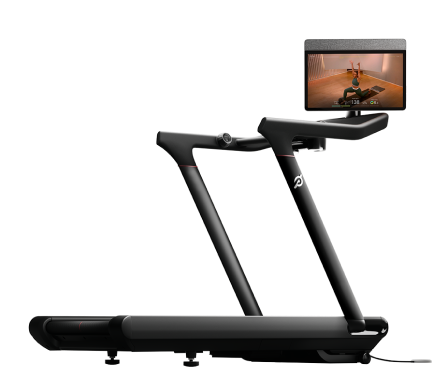
PeopleImages via Getty Images
The Incredible Power of Positive Self-Talk During a Workout—and During Everyday Life
Here's how to cultivate an inner voice that hypes you up instead of tearing you down.
By Michelle Konstantinovsky•
What Is Positive Self-Talk?
Examples of Positive Self-Talk
Benefits of Using Positive Self-Talk
How to Start Using More Positive Self-Talk
The Takeaway
You know that feeling when you’re struggling to reach the peak of a grueling workout and your Peloton instructor says something so morale-boosting, you’re convinced it’s why you achieved a new personal best? Imagine if that inspirational voice was actually your own and it was accessible at any time—you might see why positive self-talk can be pretty transformative.
Discover more ways to reach your goals with Peloton
Sometimes referred to as your “inner voice,” self-talk is that stream of consciousness that accompanies you throughout your day and is made up of both conscious thoughts and your unconscious beliefs. Your self-talk effectively becomes the lens through which you see the world, and learning to shift the tone of that inner voice to be more positive can help you improve in a variety of areas, including fitness.
“Positive self-talk is particularly powerful when it comes to exercise,” says licensed therapist and author Jenn Mann. “The message we tell ourselves before, during, and after exercise is a huge determinant regarding whether or not we exercise consistently. It also has a huge influence on the quality of our exercise experience as well as how we progress.”
Read on for the ins and outs of positive self-talk and how to use it to optimize your focus, boost your confidence, and fuel your workouts.
What Is Positive Self-Talk?
We all experience positive and negative thoughts, and both types influence the tone of our inner monologues. Some of those thoughts—whether positive or negative—are the result of logic and reason, but others may be influenced by misconceptions or misinformation. Interrogating our own thoughts and actively working to take an optimistic and productive point of view when appropriate can go a long way in improving different areas of our lives.
“Much like the cartoon character that has an angel on one shoulder and the devil on the other, we all have a healthy voice and an unhealthy voice,” Mann says. “Our positive self-talk comes from that healthy voice and tends to uplift us and motivate us. Our negative self-talk comes from that unhealthy voice and is oftentimes a compilation of other people‘s voices that have negatively influenced our life and our self-esteem.”
According to Judy L. Van Raalte, Ph.D., professor emerita of psychology at Springfield College, current conceptualizations of self-talk—particularly in exercise and sport—include two categories: System 1 and System 2. “System 1 is the quick, spontaneous self-talk that comes to mind like, ‘Oh yeah!’ or ‘I’m dying here,’” Van Raalte explains. “System 2 is what people intentionally use and is either positively-toned, like, ‘You can do it!’ and ‘Looking good,’ or instructional like, ‘Bend your knees,’ and ‘Follow through.’”
For those of us who tend to be a little (or a lot) hard on ourselves, our System 2 self-talk may sound quite a bit harsher and less constructive than what Van Raalte is describing. But while some of us may have been led to believe that berating ourselves is the only way to achieve our goals, that self-scrutiny is actually likely to backfire.
“Some people use negatively-toned System 2 self-talk like, ‘You’re weak’ and ‘Can’t you do any better?’ to motivate themselves,” Van Raalte says. “Negatively toned self-talk can work in the short run, but it seems likely that people who use System 2 self-talk to beat themselves up about exercise all the time are more likely to simply quit compared to people who are not so self-critical.”
In fact, research has shown that excessive self-criticism has been associated with greater procrastination, poorer self-control, and less motivation. So it makes sense that working to positively influence our self-talk is a worthy effort, but it does take practice. And because System 2 self-talk requires mental energy, Van Raalte says it’s important to carefully consider the phrases you choose to say to yourself, particularly when it comes to fitness.
“Choose self-talk that can help you reach your fitness and wellness goals without tiring you out mentally and making you want to quit,” she says. “Trying out self-talk and seeing how your particular self-talk works for you can be a good approach—self-talk is not a one-size-fits-all strategy.”
Examples of Positive Self-Talk
If you’re struggling to cultivate your own internal cheerleader, it may be best to emulate the experts: Peloton instructors.
“One way to think about how to use self-talk in fitness and wellness is to think about how you could be your own best coach,” Van Raalte says. “What would you like to hear from a class instructor? What makes you feel encouraged and motivated?”
Some of us can’t imagine anything more inspiring than a well-timed Jess Sims-ism like “You don’t have to, you get to” or Robin Arzón’s regal mantra, “Chin up, crown on.” But the beauty of positive self-talk is learning to create your own customized and streamlined self-celebratory language.
“Some people find that motivational statements are helpful,” Van Raalte says. “Like ‘You can do it,’ ‘Almost there,’ and ‘Getting stronger.’ Some people like to focus on their form or breathing as a way to move toward their goals. Using just a few words like ‘Straight back’ or ‘Breathe in, breathe out’ can be helpful. Simple self-talk lets you use most of your mental energy for exercising.”
In Mann’s case, cultivating positive self-talk in her athletic endeavors was a game-changer in her overall enjoyment and consistency as an exerciser. “I’m not a natural-born distance runner,” she says. “When I run, it’s easy for me to negatively compare myself to other people who are better runners or say negative things in my mind. If I do that, it makes running more difficult and makes it a negative experience.”
Instead, Mann has intentionally amassed a collection of mantras infused with positive messages to fuel her self-talk before, during, and after runs. “I have this so deeply ingrained in my brain from practice that when I let my brain wander, it automatically goes to these positive mantras,” she says.
If the idea of hyping yourself up is eye-roll-inducing, take heart: You don’t initially have to fully believe your own self-talk (but it does have to personally resonate with you—more on that in a bit).
“Our self-talk trains our brain,” Mann says. “When we talk to ourselves negatively, we train our brain for the negative and create additional stress. A lot of the time with positive self-talk, we don’t believe it in the beginning; that is part of reprogramming our thinking patterns. Some of my running mantras are, ‘I am strong,’ ‘I am light,’ and ‘I can do this’—these positive statements give me energy and uplift me when I run. At first, I didn’t believe them, but I found that seeing them over and over again shifted my thinking and made me believe them.”
Benefits of Using Positive Self-Talk
The most obvious benefit of using positive self-talk is the feel-good aspect: Talking to yourself kindly just tends to feel a whole lot better than the alternative. “Self-compassion—speaking to yourself in a kind way—is encouraging,” Van Raalte says. “People who feel encouraged and supported tend to work hard in the long run. Some people think that they need to push themselves hard with their self-talk and use self-criticism to achieve their goals. But people who try self-compassion—‘This is hard and you're doing it!’ rather than ‘You stink, you're so weak’—may find that they are able to get fit and enjoy their fitness and wellness activities.”
Aside from a general sense of joy (a major perk in and of itself), positive self-talk has been shown to offer a whole host of other benefits. In addition to improved focus and attention, better moods, and reduced anxiety, positive self-talk can boost motivation and promote “effortful behavior,” as demonstrated in a 2020 study on shooting athletes.
“The researchers found that those using positive self-talk were more motivated and experienced more effort value, had more fun, were more interested, and had greater competency in skill,” Mann explains. “Positive self-talk also reduces perceived exertion, creates a sense of self-efficacy, and leads to greater success.”
A 2017 paper from Van Raalte and colleagues found that “positive, instructional, and motivational self-talk enhance sports performance,” but it’s important to formulate self-talk that’s appropriate for the individual athlete. For example, forcing yourself to recite positive statements that totally clash with your own beliefs may not be effective, while finding positive ways to speak to yourself that feel aligned with who you are can significantly boost your performance.
How to Start Using More Positive Self-Talk
1. Select Self-Talk That Feels Right for You
Putting a positive spin on your internal monologue may be the goal, but it’s important to make sure your new arsenal of go-to phrases feels authentic. Think about the types of positive statements that fit with your personality, your lifestyle, and your sport of choice. For example, if you play a team sport, how might that affect what you say to yourself?)
And always remember to keep things constructive. “Choose self-talk that sounds like what a supportive—not angry or critical—coach would say,” Van Raalte says.
2. Discover Your Mantras and Use Them Often
“One of the best exercises you can do is to divide a paper into two columns,” Mann says. “On the left side of the paper, write down all of your negative self-talk. On the right side of the paper, write down a response to each of your negative ideas. This creates positive self-talk and mantras.”
Once you have your go-to list of mantras, try saying them to yourself—out loud!—once in the morning and once before bedtime. And if the mantras are specifically related to exercise, Mann suggests speaking them aloud mid-workout too.
3. Keep Your Sayings Short and Sweet
Once you start brainstorming self-talk sayings, you may gain enough momentum to create entire paragraphs dedicated to your awesomeness. While that enthusiasm will serve you well, do your best to conserve some of that excitement and keep things concise. “Using self-talk takes mental energy,” Van Raalte says. “To save energy for your workouts, choose self-talk that uses short phrases and keywords.”
The Takeaway
Positive self-talk can have a seriously profound impact on your overall well-being and your performance in everything from academics to exercise. While some of our internal monologue is quick and spontaneous, some is the result of intentional and directed thinking; by learning to steer those thoughts in a positive direction, you can actually boost your motivation, enjoyment, and output.

Peloton App
Access thousands of classes with no equipment needed.
This content is for informational and educational purposes only and does not constitute individualized advice. It is not intended to replace professional medical evaluation, diagnosis, or treatment. Seek the advice of your physician for questions you may have regarding your health or a medical condition. If you are having a medical emergency, call your physician or 911 immediately.
Our Products
Strengthen your mind-body connection
Enter your email to get articles, expert-backed tips, and updates from Peloton sent to your inbox.
By providing your email address, you agree to receive marketing communications from Peloton.
For more about how we use your information, see our Privacy Policy.

















